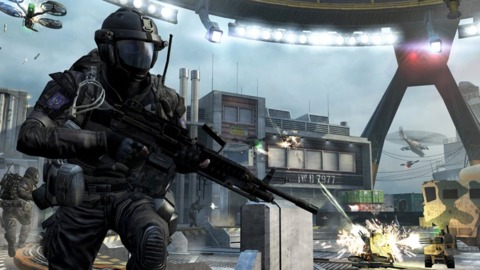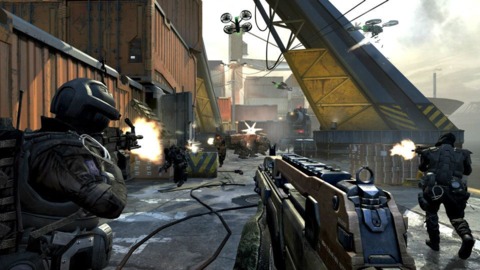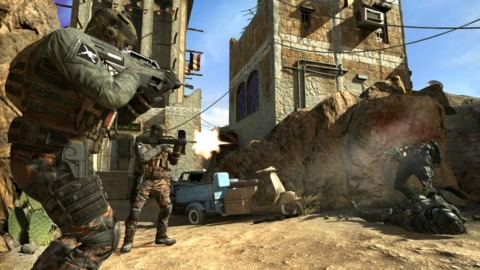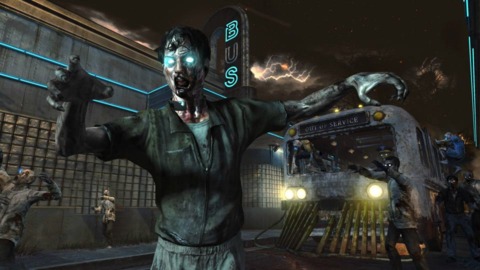Call of Duty: Black Ops II Review

Call of Duty: Black Ops II is the sixth COD game to be released since Call of Duty 4 came out and changed the way we think about first-person shooters on consoles back in 2007. It's also the first to feel like it's coming from developers that realize that this franchise is in need of some more meaningful changes than new maps and a retooled multiplayer unlock system. That manifests most clearly in the game's ambitious single-player campaign, which isn't without fault, but the way it integrates player choice into the proceedings is fantastic, helping you to craft a Call of Duty tale that feels like a product of the decisions you make along the way. The rest of the package? Pretty much exactly what you'd expect, but a little bigger and a little bolder.
The single-player portion of Black Ops II is split between two eras, giving you a chance to check-in on Alex Mason and Frank Woods as they tear up the CIA's hottest secret conflicts of the '80s while also giving you control of Mason's son, David, in the year 2025. The past is told via flashback as the younger Mason visits Frank Woods, now confined to a wheelchair, but almost every mission is focused on the same target: Raul Menendez. This terrorist is up to no good in the "present" day, but David Mason needs to know why this guy is so persistent and, seemingly, so focused on Mason himself. The reasons go back to when his father and Woods were hot on the guy's trail.
All of this story is set against a new Cold War with China, but the world's problems take a backseat to the more personal story of Menendez, his sister, and his over-the-top quest for revenge against the guys that wronged him. By the end, he's controlling huge drone fleets and bringing the world to the brink of war. It's outlandish and ridiculous to think that one determined man could bring all this about. It's the sort of thing you'd expect to see in a proper action movie, which, with all the jumping back and forth between quiet nights deep inside Noriega's Panama and the deck of an aircraft carrier as it comes under attack, sums up the pacing and feel of Black Ops II's campaign. Compared to the past games in the series, the story feels far more personal. It still jumps between characters in traditional Call of Duty fashion, but each character is meaningful and each conflict is more directly tied to the overall plot. It unfolds in a fascinating way, and you'll actually have some very real agency in how that plot unfolds.

The Black Ops II campaign lets you make choices that can wildly impact the events that follow. Those choices start at the beginning of each mission, which lets you configure your own loadout and select some additional items and perks, further merging concepts from the game's multiplayer side into the campaign. It's a neat option, but the default configuration, which includes a tool kit that lets you pry open optional doors and chests to get some additional items throughout the game, is usually sufficient.
From there, though, the choices aren't always so obvious. Yes, you'll get a couple of "press X to shoot that guy, press A to spare him" sort of moments, and those are tense for their own reasons, but the interesting thing about Black Ops II is that it doesn't always telegraph its branches. Most of the decisions come as a part of gameplay. In one case, and without saying too much about the actual setting, you'll hear from other characters that some intel is in danger of being destroyed by the enemy. As you enter the area, you'll start to see characters scramble and attempt to burn paperwork. If you stop them, that intel is yours. If they manage to burn the information, that's one piece of the puzzle that you won't have. Some of these only payoff with additional lines of dialogue. Others make you suspect characters of wrongdoing by filling in a few more blanks than you'd have if you just shoot your way through the game without thinking about it. And others have a direct impact on who lives and who dies. It's not that every single choice is incredibly vital and Earth-shattering. It's that you're never quite sure that you're doing the right thing or behaving in the right way, and the route to what you'd probably consider the "happiest" version of the ending isn't clear. In a year filled with games that handle player choice in different ways, the Black Ops II campaign manages to be right up there with the best.
Strip away the interesting wrapper and, well, you've got something that pretty closely resembles the tone and pacing of most Call of Duty campaigns. You'll shoot your way into and out of situations in the past and in the future, and most of that gameplay boils down to pulling the left trigger to snap onto a guy and pulling the right trigger to take him out. At least it's better about not making you feel like you're just following an invincible AI character with a helpful "FOLLOW" tag placed above its head through the entire game. Some areas are much larger than you'd expect to see in a Call of Duty campaign, like an Afghanistan level that has you riding horses from place to place as you try to cut off a Russian attack. At times the action more closely resembles Halo's wide-open, multi-approach areas than the tight corridors and one-track focus you've come to expect from the franchise. Outside of that, however, things in the campaign start to fray under scrutiny. Parts of the campaign feel a little disjointed as you leap from one part of the world to another with thin connective tissue between some of the missions. And that jet flying portion that they've been showing off since E3? Not fun at all.
Black Ops II also includes optional missions that play out on a few of the game's multiplayer maps. These "Strike Force" missions give you multiple objectives to complete, such as a series of missile batteries that must be hacked in a way that makes you feel like you're taking over a multiplayer control point. But the catch is that you're controlling an entire force of men and drones. You can swap to any other unit quickly via the D-pad, or pull out to a tactical view. In either view, you're able to issue commands to the other soldiers, presumably to move them around the battlefield and have them fortify positions. If you fail a Strike Force mission, you'll be able to retry it, but you have a limited number of retries. If you fail to complete these missions, the outcome of the overall story changes. And, depending on how you perform in the "normal" levels, you might not even see all of the possible Strike Force scenarios. It's a fascinating idea that would work out a lot better if the AI didn't appear to be completely broken. On numerous occasions I'd issue orders to my AI-controlled troops and get no response. They'd just stand around their spawning area and do absolutely nothing, forcing me to take very direct control of the action. I was still able to complete the missions without much issue, too, which sort of defeats the whole purpose. It's a neat idea that feels completely half-baked, at best.

Once you've completed the campaign, you can go back and attempt to see some of the different ways it can play out, but you'll have to do this via a "rewind story" option that essentially rolls your save file back to an earlier state. From there, you can play out whatever alternate choices you like and see the game through to a different conclusion. You can also just replay any mission, but you can't alter any of your choices if you go that route. All told, it's a surprisingly satisfying campaign, even considering the failure of the Strike Force missions. The story is the star here, with clever care given to making the player understand Menendez's actions. It also goes in some gory directions, with a weird focus on forcing you to stare into peoples' eyes as they're being horrifically murdered, often by your hand. It's more hilarious or hokey than haunting, but maybe that just means I'm a soulless husk that has become completely unable to feel anything, ever.
Which brings us to multiplayer. Black Ops II rewrites the rules for unlocking things and creating classes yet again. You'd think that at least one of the studios working on this franchise would have gotten it right by now. But the way Black Ops II handles class creation is an interesting break from the norm that will feel subtle to casual players. Rather than just filling out the class creation form in a slightly different way, Black Ops II lets you rewrite it a bit. Want to take six perks into combat instead of the standard three? There's a way to do that, but it involves carrying no grenades and only one attachment-free gun. Want to go in completely bare? Sure, strip it all away and run in with no perks and just a knife to keep you company. All this is done in such a way that you can even further create classes that cater to your play style, and the results are interesting. But you still have to deal with weapons that unlock in a set order (though even then you need to cash in an unlock token in order to actually use any of the new things you're unlocking). That means you'll level up and, yay, you've unlocked a sniper rifle that you'll never use. Or, at least, I'll never use it. After six years of playing this game with varying degrees of prowess, I know what I like. Climbing up the unlock tree yet again only to see it filled with options that I'll never want to use just sounds like more trouble than it's worth at this point.
That said, the action continues to feel snappy and it responds precisely the way you'd expect a Call of Duty game to respond. It's covered with the same sorts of playlists and game types you'd expect to see, including last year's Kill Confirmed. A new mode, called Hardpoint, brings a King of the Hill-type experience to the game that recalls Headquarters but feels faster and more dynamic since you won't have to wait until an HQ is destroyed before you spawn again. The wager match modes of the original Black Ops return with full, proper matchmaking support, but it's a shame that more modes weren't added here, as they're still pretty cool, even if you're not actually wagering anything this time around. Diving to prone by holding the duck button while running is back in the game--hopefully to stay this time. Bots are also available and they appear in a new matchmaking mode for new players, too.
Around the action, some additional changes have been made. There's a new spectator mode and a weirdly limited ability to stream out some of your matches live on YouTube. There's also a league option that lets you go in alone or team up with players to play placement matches and make your way onto a StarCraft II-like ladder system, which should be pretty cool for people who take this stuff more seriously than most. Additionally, the 13 maps that ship with the game are quite good, ranging in size and shape while still retaining that core Call of Duty concept of ensuring that, unless you're working with a team, you'll probably get shot in the back a lot. It's easy to moan about the way that the core experience has remained largely unchanged across almost all of Black Ops II, but, for as much as I feel like I'm ready to say "OK, this is it, this is the last year," it still sucks me back in. But it does so a little less each time out. By this point, I've built up a solid tolerance to this game's multiplayer charms. It's well-made and looks great, but I find myself playing less and less of it every year. I don't see anything here that's going to reverse that trend, but the changes in multiplayer are intelligently designed.

The third main menu option in Black Ops II simply says "Zombies." This wave-based survival mode has become incredibly popular on its own and, now more than ever, it feels completely out of place when put next to the rest of the package. Tonally, it's full of a bunch of quirky, weird characters and dialogue that, as someone who didn't obsessively play the mode in the last Black Ops, makes no sense whatsoever. New modes have been added, including one that lets you get on a bus and move between multiple large areas, rather than being simply confined to a tight, single space. There's also a new multiplayer option that lets two teams of four annoy each other while also fighting zombies. In this mode, called Grief, you can't directly damage the opposing team, but you can shoot or stab them to blur their vision and shove them around the map, hopefully into a collection of zombies. This was a neat idea back in World at War, and I understand that people seem to like it, but I just can't stand it. All the dopey little upgrades and "monkey bombs" and its deliberately opaque story add up to something that deserves to be broken out into its own game, if only to get it out of this game that I otherwise enjoy quite a bit. I'll take Spec Ops mode over Zombies any day of the week.
The presentation end of Black Ops II is buoyed by a terrific dedication to making kick-ass weapon effects. On the appropriate sound system, each rifle shot sounds intense in a way that most other shooters don't match, and in cases where the audio designers have had to invent effects for futuristic weapons, there's a tasteful restraint that keeps them from sounding like ridiculous ray guns. The audio hits hard, even if the little "surprise" post-credit song sequence leaves you with a bad sound in your ears when all is said and done. Visually, the game looks better than its predecessors, with the most obvious improvement showing on the faces of the people you talk to in the campaign. They look more lifelike than they have in the past, which helps get the game's story across. It also handles large areas quite nicely, without huge sacrifices to the frame rate.
It's weird to come away feeling positive about a game right after you've just told someone that a full third of it is essentially useless to you, but then Call of Duty: Black Ops II is a big game with a whole lot going on. It doesn't reinvent the wheel, and some of the multiplayer changes feel more like they're propping up an aging concept rather than truly moving it forward, even though it's still a good way to spend time with your online friends. For me, it's the notion that Call of Duty is showing some terrific signs of life on the campaign side that left me the most impressed. It's got its share of flaws, but overall Treyarch has assembled a great, fast, and fun first-person shooter that, even if you were thinking about finally skipping a year, is still worth your time.
